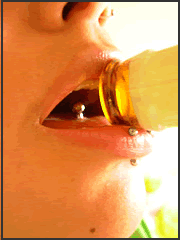Published: March 24, 2008
New research led by Dr Nathalie Fontaine, UCL Psychology, has found that hyperactivity and aggression in young girls is linked to greater risk of smoking addiction, mentally abusive relationships, teenage pregnancy and low job prospects later in life.
In a collaborative study published in ‘Archives of General Psychiatry’, Dr Fontaine’s team followed the lives of 810 young Canadian girls from the age of six to 21. Around one in ten had hyperactive behaviour, while another one in ten had both hyperactive and aggressive behaviour. While for the majority of girls, these behaviours calmed down by the age of 12, these two groups showed a higher tendency to develop adjustment problems in adulthood. [continue reading…]
Published: March 22, 2008
Gender-specific research published by SAGE in Crime & Delinquency
 The study, conducted by Northeastern University researchers, looked separately at delinquency and risky behaviors for both young men and young women in a suburban high school and how involvement in outside activities influenced those behaviors. The findings provided interesting, and, in some cases, surprising results. [continue reading…]
The study, conducted by Northeastern University researchers, looked separately at delinquency and risky behaviors for both young men and young women in a suburban high school and how involvement in outside activities influenced those behaviors. The findings provided interesting, and, in some cases, surprising results. [continue reading…]
Published: March 20, 2008
 Documenting a “twofold to fivefold” increase in personal problems among adolescents with persistent sleeplessness, public health researchers at The University of Texas Health Science Center at Houston say they have completed the first prospective study demonstrating the negative impact of chronic insomnia on 11 to 17 year olds. More than one fourth of the youths surveyed had one or more symptoms of insomnia and almost half of these youngsters had chronic conditions. Findings appear in the March issue of the “Journal of Adolescent Health” and are based on interviews with 3,134 adolescents in metropolitan Houston. [continue reading…]
Documenting a “twofold to fivefold” increase in personal problems among adolescents with persistent sleeplessness, public health researchers at The University of Texas Health Science Center at Houston say they have completed the first prospective study demonstrating the negative impact of chronic insomnia on 11 to 17 year olds. More than one fourth of the youths surveyed had one or more symptoms of insomnia and almost half of these youngsters had chronic conditions. Findings appear in the March issue of the “Journal of Adolescent Health” and are based on interviews with 3,134 adolescents in metropolitan Houston. [continue reading…]
Published: March 18, 2008
 Keeping middle schoolers from alcohol is a tougher task in the inner city than in rural areas, even for experts armed with the best prevention programs, a new University of Florida study shows.
Keeping middle schoolers from alcohol is a tougher task in the inner city than in rural areas, even for experts armed with the best prevention programs, a new University of Florida study shows.
A three-year, three-pronged prevention program did little to keep Chicago middle schoolers from drinking or using drugs, despite its prior success in rural Minnesota, where the program reduced alcohol use 20 to 30 percent, UF and University of Minnesota researchers recently reported in the online edition of the journal Addiction. [continue reading…]



